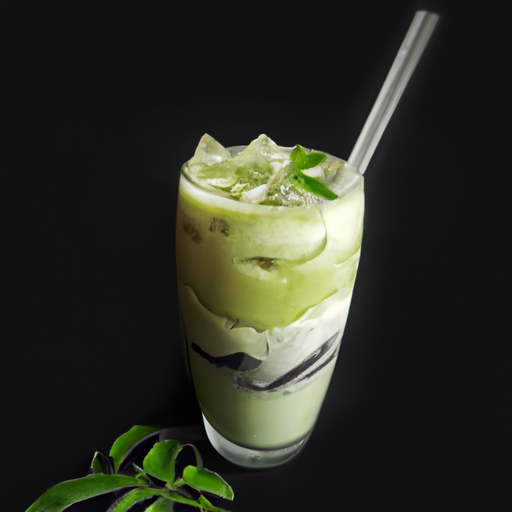I’m totally obsessed with matcha tea! Since the moment I stumbled upon this lively green beverage, its distinct taste and energizing benefits have completely captivated me.
But with so many different opinions out there about when to drink matcha, it can be hard to know the best time to enjoy a cup. That’s why I decided to do some research and share my findings with you.
In this article, I’ll explore the benefits of matcha tea and the factors you should consider when choosing the best time to drink it. Whether you’re a morning person, an afternoon sipper, or someone who likes to wind down at night, I’ll give you some tips on how to incorporate matcha into your daily routine for maximum health benefits.
So grab a cup of tea (matcha, of course!) and let’s dive in!
Key Takeaways
- Consider caffeine sensitivity and avoid drinking in the late afternoon or evening due to high caffeine content
- Great morning drink for productivity and afternoon pick-me-up for sustained energy
- Drinking before exercise can boost endurance and performance, enhance fat burning, and improve recovery time
- Can be used as a calming drink in the evening to wind down before bedtime
Understanding the Benefits of Matcha Tea
You’ll want to drink matcha tea regularly because it’s loaded with antioxidants and can help boost your metabolism. Matcha health benefits are numerous and well documented.
For starters, matcha is packed with catechins, a type of antioxidant that helps protect your body against damage from free radicals. These catechins have been linked to a wide range of health benefits, including reduced risk of cancer, heart disease, and stroke.
Additionally, matcha contains L-theanine, an amino acid that promotes relaxation and can help reduce stress and anxiety.
When it comes to flavor profiles, matcha has a unique taste that sets it apart from other types of tea. The taste is often described as earthy and vegetal, with a hint of sweetness. The flavor can be quite strong, so it’s important to choose a high-quality matcha that is well balanced and not too bitter.
The best matcha is made from shade-grown tea leaves that are hand-picked and stone-ground, producing a fine powder that dissolves easily in water.
So, with all these health benefits and unique flavor profiles, when is the best time to drink matcha? There are several factors to consider, including your personal preferences, your health goals, and the time of day. But don’t worry, we’ll cover all of that in the next section.
Factors to Consider When Choosing the Best Time to Drink Matcha
When it comes to choosing the best time to drink matcha, there are a few factors that I always consider.
First, my caffeine sensitivity plays a big role, as matcha contains more caffeine than regular green tea.
Second, I take into account my personal schedule and lifestyle, as drinking matcha at the wrong time can disrupt my day.
And finally, I think about meal times and how matcha can fit into my daily diet.
By considering these factors, I can make sure that I get the most out of my matcha experience.
Caffeine Sensitivity
For those who are caffeine sensitive, enjoying a cup of matcha tea may evoke memories of feeling jittery and anxious after drinking coffee. However, despite the high caffeine content in matcha, it’s possible to still enjoy this delicious tea without experiencing the negative side effects of caffeine.
One option is to look for caffeine alternatives, such as decaf matcha or herbal teas that have a lower caffeine content. Another option is to manage caffeine intake by starting with a small amount of matcha and gradually increasing the amount consumed over time.
It’s important to remember that everyone’s caffeine tolerance is different, and what works for one person may not work for another. With that in mind, it’s important to listen to your body and adjust your matcha intake accordingly.
In the next section, we’ll look at how personal schedule and lifestyle can also play a role in determining the best time to enjoy matcha.
Personal Schedule and Lifestyle
As you’re busy, think about when you need a little energy boost and how a soothing drink can help. Consider your daily routines and time management when deciding when to drink matcha tea. Here are some ideas to get you started:
- Start your day with matcha to wake up and focus on your morning tasks.
- Have a mid-morning matcha break to combat the mid-morning slump and stay energized until lunch.
- Sip matcha during your afternoon work session to power through those last few tasks of the day.
- Enjoy a calming cup of matcha in the evening to wind down before bedtime.
Incorporating matcha into your daily routine can help you stay energized and focused throughout the day. Now let’s talk about how to incorporate matcha into your meal times.
Meal Times
At meal times, incorporating matcha powder into your dishes can add a unique depth of flavor and increase the nutritional value of your food. Matcha is versatile and pairs well with both sweet and savory dishes. It can be added to smoothies, baked goods, and even salad dressings.
To help you get started, here’s a table of some delicious matcha pairing ideas for meal times:
| Meal Time | Matcha Pairing |
|---|---|
| Breakfast | Matcha Latte |
| Lunch | Matcha Salad |
| Dinner | Matcha Stir Fry |
However, it’s important to note that there are time restrictions when it comes to consuming matcha. Due to its high caffeine content, it’s recommended to avoid consuming matcha in the late afternoon or evening to avoid disrupting your sleep schedule.
Transitioning into the next section, drinking matcha in the morning is a great way to start your day on a healthy note.
Drinking Matcha in the Morning
Start your morning off right by drinking matcha tea. As someone who takes morning rituals seriously, I’ve found that matcha has become a staple in my routine.
Not only does it provide a sense of calm, but it also gives me the energy boost I need to start my day. Unlike coffee, matcha contains L-theanine, which helps to minimize the jitters that can come with caffeine, while still providing a productive kick.
Incorporating matcha into your morning routine can help maximize productivity. The caffeine in matcha is released slowly, providing a sustained energy boost throughout the day. Additionally, matcha is packed with antioxidants, which can help to strengthen your immune system.
By drinking matcha in the morning, you’re setting yourself up for a successful and productive day. As the day goes on, you may find yourself in need of another energy boost. That’s where drinking matcha in the afternoon comes in, but we’ll get to that in the next section.
For now, start your day off right with a warm cup of matcha tea and feel the benefits of a calm, productive morning.
Drinking Matcha in the Afternoon
By mid-afternoon, you may find yourself feeling drained and in need of a pick-me-up, and that’s when a refreshing, antioxidant-packed cup of matcha can come to the rescue.
Matcha has different flavor profiles that range from earthy to sweet, making it a versatile beverage that can be enjoyed hot or cold. One of my favorite ways to have matcha in the afternoon is by making a creamy matcha latte with almond milk and a touch of honey.
When it comes to an afternoon pick-me-up, matcha is an excellent choice because it contains caffeine and L-theanine, an amino acid that promotes relaxation and reduces anxiety. Unlike coffee, matcha provides a smoother and more sustained energy boost that doesn’t lead to a crash later on.
Additionally, the antioxidants in matcha help protect the body against free radicals and inflammation, supporting overall health and well-being.
Before I head to the gym for a workout, I like to have a cup of matcha to help me power through. The combination of caffeine and L-theanine in matcha helps improve focus and concentration, making it easier to push through a tough workout.
Plus, the antioxidants in matcha can help reduce muscle soreness and inflammation, allowing for a quicker recovery time. Drinking matcha before exercise is a great way to support both physical and mental performance.
Drinking Matcha Before Exercise
I love drinking matcha before exercising because it gives me an extra boost of energy and helps me power through my workout.
Not only that, but it also has some amazing benefits for my body. Matcha can boost endurance and performance, enhance fat burning, and even improve recovery time.
It’s definitely become a staple in my pre-workout routine.
Boosting Endurance and Performance
Feeling a bit sluggish during your workout? Try drinking matcha tea before your next gym session to give your endurance and performance a boost! Matcha tea is a great way to enhance your workout performance, as it contains a unique combination of caffeine and L-theanine.
Here are five ways that drinking matcha tea can help you boost your endurance and performance:
- Boosting mental clarity and increasing focus: Matcha tea contains L-theanine, an amino acid that promotes relaxation and reduces stress. This means that drinking matcha tea before your workout can help you stay focused and alert during your session.
- Providing sustained energy: Unlike coffee, matcha tea provides a steady stream of energy that lasts for several hours. This means that you won’t experience a crash mid-workout, and can power through your session with ease.
- Boosting metabolism: Matcha tea contains catechins, a type of antioxidant that has been shown to boost metabolism and increase fat burning.
- Reducing muscle damage: Matcha tea contains a high concentration of antioxidants, which can help reduce muscle damage caused by exercise.
- Improving oxygen uptake: Matcha tea has been shown to improve oxygen uptake during exercise, which can help you perform better and improve your endurance.
By incorporating matcha tea into your pre-workout routine, you can give yourself a boost that will help you power through your session with ease. And, as we’ll see in the next section, matcha tea can also be a great way to enhance fat burning!
Enhancing Fat Burning
Get ready to watch those extra pounds melt away as you discover how matcha can enhance your fat burning abilities! Matcha tea is known to boost metabolism, which means it can help you burn calories faster and more efficiently.
The combination of caffeine and catechins (a type of antioxidant) in matcha tea helps to stimulate the body’s natural fat-burning processes, making it a great addition to any weight loss regimen. Studies have shown that drinking matcha regularly can increase the body’s ability to burn fat during exercise, making it a great pre-workout drink for those looking to shed some pounds.
Additionally, matcha tea has been found to help reduce the accumulation of fat in the body, making it a great option for those looking to maintain a healthy weight. So, if you’re looking to enhance your fat burning abilities, start incorporating matcha tea into your daily routine today!
Now, let’s move on to the next topic: improving recovery time.
Improving Recovery Time
Improve your post-workout recovery time with the help of matcha’s natural properties. Matcha is rich in antioxidants that can prevent muscle soreness and reduce inflammation. These properties can help you recover more quickly after a workout, so you can get back to your routine sooner.
Here are some ways in which matcha can help with post-workout recovery:
- Matcha contains catechins, which are antioxidants that can reduce inflammation and muscle damage.
- The caffeine in matcha can help to reduce muscle soreness and improve muscle strength.
- Matcha is also high in L-theanine, an amino acid that can help to reduce stress and improve focus.
- Matcha can improve blood flow, which can help to deliver nutrients and oxygen to muscles more quickly.
- Matcha can also help to reduce oxidative stress, which can contribute to muscle damage and inflammation.
Drinking matcha before bed can also have benefits for your health.
Drinking Matcha Before Bed
Sipping on a warm cup of matcha before hitting the hay can transport you to a peaceful and restful slumber. Not only does matcha tea help you relax, but it also boasts a range of health benefits.
Matcha tea is packed with antioxidants, amino acids, and caffeine, which can help boost metabolism, improve brain function, and promote overall well-being. However, drinking matcha before bed may not be suitable for everyone. The caffeine content in matcha tea can vary, and some people may be more sensitive to it than others. Consuming caffeine before bed can disrupt sleep patterns and lead to insomnia.
It’s important to know your body’s caffeine tolerance and to avoid drinking matcha tea before bedtime if you’re sensitive to caffeine. If you’re looking to unwind and enjoy the benefits of matcha tea without sacrificing sleep, try drinking it earlier in the day.
You can still enjoy all the health benefits of matcha tea without risking sleep disruption. Plus, drinking matcha earlier in the day can help boost your metabolism and improve your focus throughout the day. So, before you reach for that cup of matcha tea before bed, think about timing and how it may affect your sleep.
To get the most out of your matcha tea experience, it’s important to make the perfect cup. Here are some tips to help you make the perfect cup of matcha tea.
Tips for Making the Perfect Cup of Matcha
To ensure a delicious and flawless matcha experience, you’ll want to follow these simple tips for crafting the perfect cup. The key to a great cup of matcha lies in the preparation and brewing techniques. Firstly, make sure to sift your matcha powder before use. This ensures that any clumps are broken up and results in a smoother consistency.
Next, use water that is just below boiling temperature. This means bringing the water to a boil and then allowing it to cool for a few minutes before adding it to your matcha. Using water that is too hot can result in a bitter taste. Additionally, use a bamboo whisk to mix the matcha with the water in a back-and-forth motion until a frothy consistency is achieved.
To make it easier for you, I have created a simple table that outlines the steps to prepare the perfect cup of matcha:
| Step | Instruction |
|---|---|
| 1 | Sift matcha powder |
| 2 | Heat water just below boiling temperature |
| 3 | Add water to matcha powder |
| 4 | Use a bamboo whisk to mix in a back-and-forth motion until frothy |
By following these simple tips and using the table as a guide, you can make the perfect cup of matcha. But don’t stop there! Experiment with different matcha recipes to find your favorite.
Experimenting with Matcha Recipes
You can get creative with your matcha by trying out different recipes that incorporate this versatile ingredient. For example, you can add it to smoothies or bake with it. Matcha smoothies are a refreshing and healthy way to start your day, and they’re easy to make. Simply blend matcha powder, your favorite fruits, and a liquid base like almond milk or coconut water. You can also add sweeteners like honey or agave if you prefer a sweeter taste.
Another popular way to enjoy matcha is in a latte. Matcha lattes are a tasty alternative to coffee, as they provide a gentle energy boost without the jitters. To make a matcha latte, whisk matcha powder with hot water until it forms a smooth paste. Then, add steamed milk and sweeteners like vanilla syrup or maple syrup. You can also make a cold matcha latte by whisking the matcha paste with cold milk and ice cubes.
Incorporating matcha into your daily routine can have a positive impact on your health and wellbeing. Whether you prefer a warm matcha latte in the morning or a refreshing matcha smoothie in the afternoon, there are plenty of ways to enjoy this superfood. So why not give it a try and see how matcha can enhance your daily life?
Incorporating Matcha into Your Daily Routine
Incorporating matcha into your daily routine can lead to improved health and well-being. Here are three ways I’ve found to easily incorporate matcha into my daily routine:
-
Matcha smoothies: I love starting my day with a matcha smoothie. It’s a great way to get in a serving of fruits and veggies, while also getting the benefits of matcha. My go-to recipe includes frozen banana, spinach, almond milk, matcha powder, and a scoop of protein powder. It’s a delicious and nutrient-packed way to start the day.
-
Matcha latte variations: If I need a mid-day pick-me-up, I’ll make myself a matcha latte. I like to switch up the recipe to keep things interesting. Sometimes I’ll add a touch of honey or vanilla extract for sweetness, or even a dash of cinnamon for some extra flavor. Making a matcha latte is quick and easy, and it’s a great alternative to coffee.
-
Matcha-infused snacks: Another way I like to incorporate matcha into my daily routine is by adding it to my snacks. I’ll mix matcha powder into my yogurt or add it to my homemade energy balls. It’s a simple way to add some extra nutrients to my snacks, and it tastes great too. Plus, it’s a healthier alternative to sugary snacks.
Incorporating matcha into my daily routine has been a game-changer for me. Not only do I love the taste, but I’ve noticed an improvement in my energy levels and overall well-being. Try adding matcha to your daily routine with these simple tips, and see if you notice a difference too.
Frequently Asked Questions
Can matcha tea be used as a substitute for coffee?
As someone who loves both matcha tea and coffee, I can confidently say that matcha can be a great substitute for coffee.
While coffee provides a quick burst of energy, matcha offers a more sustained and calm energy boost thanks to its combination of caffeine and L-theanine, an amino acid that promotes relaxation.
Additionally, matcha is packed with antioxidants and other beneficial compounds that can support overall health and wellness.
Unlike coffee, which can cause jitters and crashes, matcha provides a sense of focused alertness without any unpleasant side effects.
So if you’re looking for a healthier, more balanced alternative to coffee, give matcha a try!
How long does the effect of matcha tea last?
The effect of matcha tea can last for several hours, depending on various factors such as your body’s metabolism, the amount consumed, and the quality of the tea.
While matcha tea is often associated with an immediate energy boost, it also offers long term benefits such as improved focus and concentration, increased metabolism, and overall wellness.
To experience the optimal benefits of matcha tea, it’s recommended to consume it in the morning or early afternoon, as it can interfere with sleep if consumed too late in the day.
So, if you’re looking for a healthy and energizing beverage that can provide lasting benefits, matcha tea might just be the perfect choice for you!
Is it safe to consume matcha tea during pregnancy?
As someone who’s experienced pregnancy, I understand how important it is to be cautious about what you consume. When it comes to matcha tea, many pregnant women wonder if it’s safe to drink. The answer is yes, in moderation.
Matcha tea contains caffeine, which should be limited during pregnancy, but it also has numerous benefits for moms-to-be. Matcha is loaded with antioxidants, which can help boost the immune system and protect against cell damage. It also contains L-theanine, an amino acid that promotes relaxation and reduces stress. Additionally, matcha can help regulate blood sugar levels, which is important for pregnant women with gestational diabetes.
So, while it’s important to be mindful of caffeine intake, the benefits of matcha for pregnancy make it a great choice for moms-to-be. Remember the adage, "everything in moderation,"and enjoy the matcha benefits for you and your baby.
Can matcha tea cause an upset stomach?
I’ve experienced an upset stomach after drinking matcha tea, but this isn’t a common side effect.
In fact, the benefits of matcha tea outweigh any potential discomfort.
Matcha tea is packed with antioxidants, boosts metabolism, and increases energy levels.
To avoid stomach issues, it’s essential to follow proper brewing tips, such as not using boiling water and not oversteeping the tea.
The best time to drink matcha tea is in the morning, as it provides a gentle caffeine boost without the jitters that come with coffee.
So, if you’re looking for a healthy and delicious beverage, give matcha tea a try!
Does matcha tea have any negative side effects?
I have to say, matcha tea is a powerhouse of nutrients and antioxidants. But with all the goodness it brings, it’s important to consider its potential negative side effects.
While matcha tea is known to boost metabolism, increase energy levels, and improve mental alertness, its high caffeine content can also cause jitters, anxiety, and insomnia in some people.
Moreover, excessive consumption of matcha tea can lead to digestive issues like bloating, nausea, and diarrhea. Therefore, it’s crucial to drink matcha tea in moderation and listen to your body’s response.
Overall, matcha tea benefits outweigh its possible negative effects, but it’s essential to be mindful of your intake and stay within the recommended dosage.
Conclusion
In conclusion, matcha tea is a powerful and delicious drink that offers a range of health benefits. Whether you’re looking for a morning boost, an afternoon pick-me-up, or a pre-workout energy boost, matcha can provide a natural and sustained source of energy without the jitters or crash associated with coffee or energy drinks.
Incorporating matcha into your daily routine is easy and fun, and there are endless ways to experiment with different recipes and preparation methods. So why not give it a try and see what all the fuss is about? After all, as the saying goes, "you never know until you try!"










